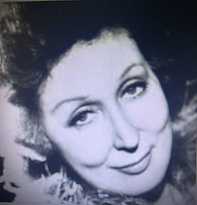
Mignon Dunn (born June 17, 1928, in Memphis, Tennessee) is an American dramatic mezzo-soprano and voice teacher. [1]

Mignon Dunn (born June 17, 1928, in Memphis, Tennessee) is an American dramatic mezzo-soprano and voice teacher. [1]
Born in Memphis, Mignon Dunn grew up in Tyronza, Arkansas and Memphis, Tennessee. She studied voice with Karin Branzell and Beverley Peck Johnson. [1] She made her professional debut, in the title role of Bizet's opera Carmen , on September 8, 1955, at the New Orleans Opera, [1] moving on to play Maddalena in Rigoletto in Chicago that same year. On March 28, 1956 she made her New York City Opera debut as the 4th Lady in Walton’s Troilus and Cressida, going on to sing several other roles with the company through 1975. Mignon Dunn made her debut with the Metropolitan Opera in 1958, as the Nurse in Boris Godunov, conducted by Dimitri Mitropoulos. [2]
Mignon Dunn is known especially for her portrayals of the dramatic Italian roles such as Amneris in Aida, Azucena in Il trovatore, Eboli in Don Carlo, both Laura and La Cieca in La gioconda, the Princess in Adriana Lecouvreur, and Santuzza in Cavalleria rusticana.

Her French repertoire includes Dalila in Samson et Dalila and Giulietta in The Tales of Hoffmann, as well as Dulcinée in Don Quichotte and Carmen, which she sang over 400 times in four different languages. [3]
Dunn's German repertoire embraced the leading mezzo roles in different productions of Wagner’s Ring, Ortrud in Lohengrin, Kundry in Parsifal, and Venus in Tannhäuser. She gave many performances of Strauss’ operas: Klytämnestra in Elektra, Herodias in Salome, and the Nurse in Die Frau ohne Schatten conducted by Wolfgang Sawallisch and directed by Jean-Pierre Ponnelle, 1986).
She sang Kostelnicka in Jenufa, Jezibaba in Rusalka, and Kabanicha in Katya Kabanova in Czech, as well as Marina in Boris Godunov in Russian. Her Spanish repertoire includes Goyescas and La vidabreve. [4]
Mignon Dunn sang the leading mezzo-soprano roles in the most important opera houses of the world. In Europe, she sang at La Scala, Milan; Vienna Staatsoper; London’s Royal Opera, Covent Garden; Paris Opéra; Moscow’s Bolshoi Theatre; Teatr Wielki, Warsaw; Hamburg Staatsoper; Deutsche Oper Berlin; the opera companies of Frankfurt and Dusseldorf; and the Verona Arena (Carmen, directed by Luca Ronconi, 1970).
In South and Central America, Ms. Dunn performed at the Teatro Colón in Buenos Aires, the Opera Nacional in Chile, Mexico City’s Bellas Artes, and the Opera of Puerto Rico. In Canada she performed with the Canadian Opera Company in Toronto and the Opéra de Montréal.
In the United States Mignon Dunn made her debut with the Metropolitan Opera in 1958, as the Nurse in Boris Godunov, conducted by Dimitri Mitropoulos. She also sang at the Chicago Lyric Opera, San Francisco Opera, New York City Opera, Santa Fe Opera, Opera Company of Boston, Opera Theater of Detroit, New Orleans Opera and Miami Opera. [4]
Ms. Dunn performed recitals all over Europe and the United States and sang with many major symphony orchestras including the New York Philharmonic and the orchestras of Chicago, Los Angeles, Philadelphia, Detroit, Cincinnati, Hamburg, and Vienna. Her varied repertoire especially featured the works of Mahler, Ravel, and Verdi. [4]
Mignon Dunn can be heard on a variety of recordings produced by EMI, Erato, and Deutsche Grammophon.
Mignon Dunn taught voice at the University Texas at Austin, University of Illinois, Northwestern University, and Brooklyn College. She was a voice faculty member at Manhattan School of Music from 1985 until her retirement in December 2023.
1974 – Mignon Dunn received an Honorary Degree from Rhodes College in Memphis, Tennessee. [5]
1984 - Mignon was interviewed by Bruce Duffie for WNIB Classical 97 in Chicago. To read the transcript visit https://www.bruceduffie.com/dunn.html [6]
2011 – Mignon Dunn was awarded the President’s Medal for Distinguished Faculty Service from Manhattan School of Music. [7]
2014 – Mignon Dunn received the Sherrill Milnes Voice Award in 2014 for her "outstanding contribution in teaching and mentoring the next generation of opera singers." [8]
2019 – Mignon Dunn received the VERA Award from The Voice Foundation, [9] and the Artist Excellence Award from the Giulio Gari Foundation. [10]
2022 - Mignon Dunn discussed her life in music with Manhattan School of Music's Alumni Council Chair Justin Bischof. To watch the interview visit https://www.youtube.com/watch?v=ZTBjy228Se8
Mignon Dunn was married to Austrian conductor Kurt Klippstätter from 1972 until his death, on January 4, 2000. [2] [11]